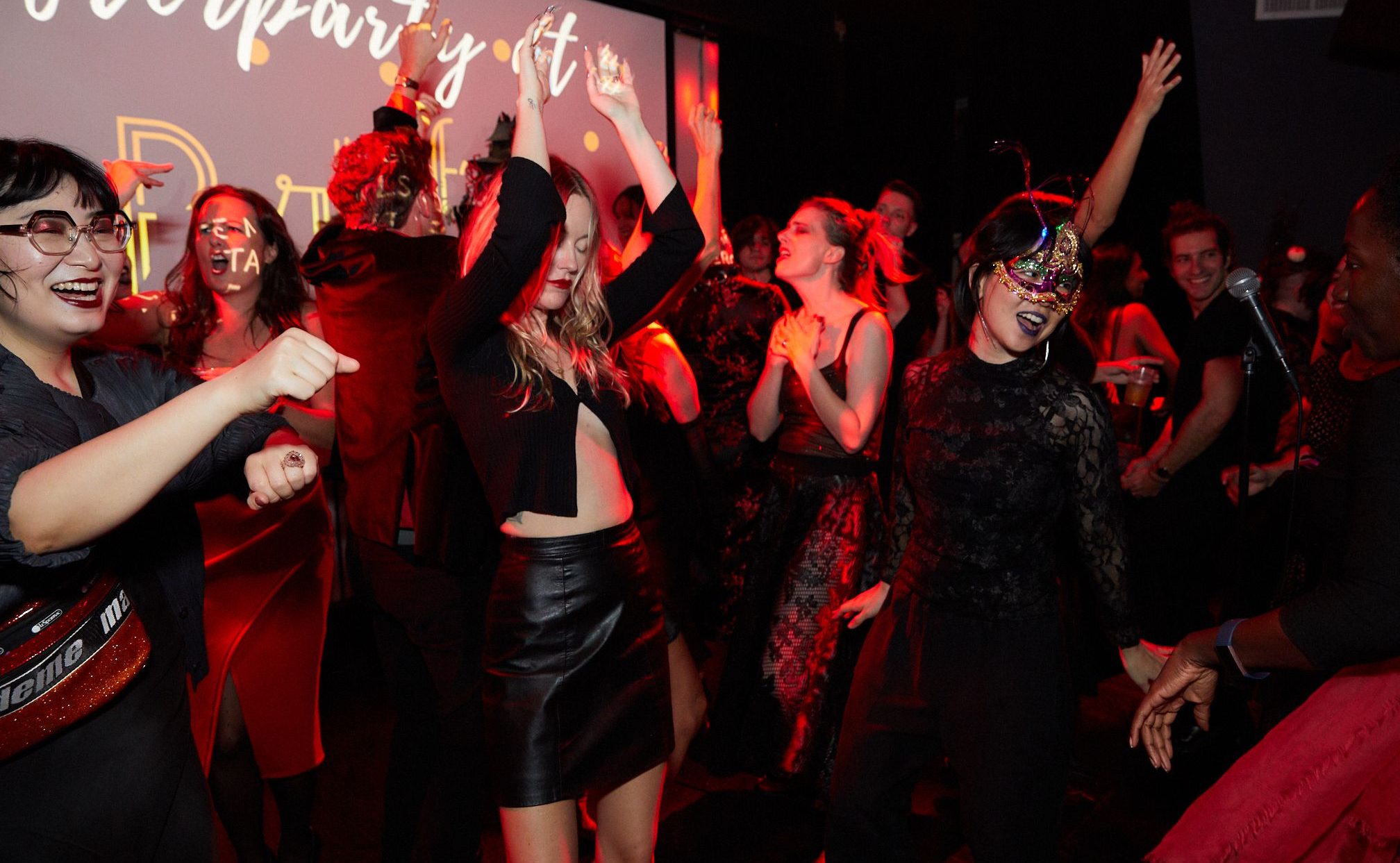news
From P-Town… “I’m a Pathological Liar,” Says the Artist Formerly Known as JT LeRoy

1. Disjecta neon as seen from outside. 2. Kevin Sampsell introducing the event and readers. 3. Author Monica Drake reads from “Coal.”

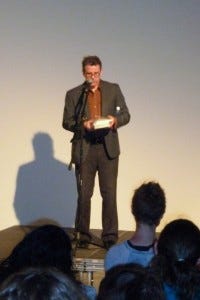
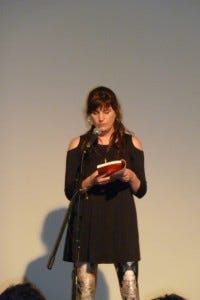
Usually, readings in Portland have a calm, supportive atmosphere, one in which the audience has come to hear and learn something new about the author, and the author has a safe place to share not only their writing, but a little of themselves. Tonight’s reading was different. Tonight, things got weird pretty quickly. Because tonight, at Disjecta Contemporary Arts in north Portland, Laura Albert had come to talk about the books she wrote as JT LeRoy.
Now, when I first heard about the reading, I had to do a little internet refresher course, since I knew that there was some controversy about the books and the author but hadn’t followed it very closely. To sum up, Albert had written several books under the pseudonym JT LeRoy, who was a transgender, sexually abused, H.I.V. infected teenage boy. Writers write under pseudonyms all the time, so I don’t think that was the issue. What became the issue was the extent to which Albert had taken the creation of LeRoy. She had given “LeRoy” an extensive and tragic background that lent an autobiographical air to the books, and that many felt played on people’s emotions. She presented her partner’s sister as “LeRoy” (having her dress in a wig and sunglasses) at public appearances, and would stand by “LeRoy’s” side as his friend “Speedie”, yet another invented character. And all of this went on for years. It wasn’t until 2007 that the hoax was confirmed. All caught up? Good. Let’s get back to what happened.
1. Aaron Scott, the arts & culture editor for Portland Monthly; Angela Mattex, artistic director of PICA; and Genevieve Hudson, writer 2. Bryan Seureth, the director of Disjecta, onstage.
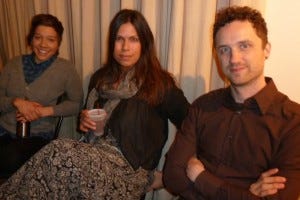
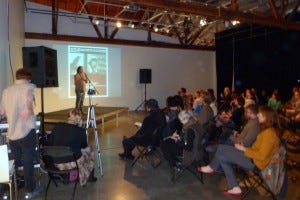
The event started simply enough, with Bryan Suereth, the director of Disjecta, giving a short introduction, followed by event organizer Kevin Sampsell giving an introduction of his own. Sampsell is a fan of LeRoy, having emailed back and forth with “him” over ten years ago, and even doing a phone interview with LeRoy in 2001 for Rain Taxi. The controversy clearly hadn’t had an effect on Sampsell’s feelings about LeRoy’s writing, and he was pleased he had convinced Albert to come, despite some apprehension on her part. He explained that two local writers, Monica Drake and Arthur Bradford, would read from her books, and then Albert would come on stage for an interview. The readings were short; Drake read from “Coal” (from The Heart is Deceitful Above All Things) and Bradford read from Sarah. And then the interview began.
1. Author Arthur Bradford with special guest Laura Albert. 2. (Left to right) Sampsell, Bradford, and Albert.
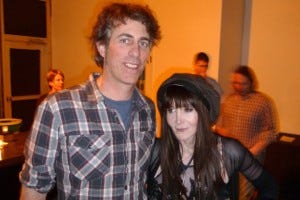
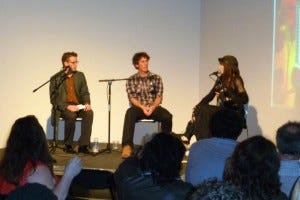
On stage were Kevin Sampsell, Arthur Bradford, and Laura Albert. The first thing Laura Albert said was, “I lied. It’s fake fiction.” I can’t tell you what questions were asked, because in answering them, Albert took us down a stream-of-consciousness rabbit hole that was both riveting and seemingly without direction. That’s not to say that I didn’t hear a lot: she was institutionalized as a child, and hadn’t gotten past sixth grade. She talked about being a ward of the state, living in group homes, and being a part of the New York punk scene, and mentioned traveling to Japan and Brazil several times. She felt that displaced, abused, and rejected people were “her people.” Albert came across as both defensive and proud in discussing how she disassociates herself, creating what she called “avatars” (both LeRoy and Speedie are avatars) to act as “asbestos gloves” that she used to handle “dangerous things.” She mentioned Courtney Love and Mary Gaitskill, and then took a couple of shots at Chuck Palahniuk and Lidia Yuknavitch who apparently had refused to appear with her. There was a story about digging a hole and screaming secrets into it. She likes the HBO show “Girls”, and thought that having an unattractive, large, black girl as the main character in Precious is what made the movie successful. I think she was trying to explain her writing by explaining herself and exploring everything that makes her, her.
1. Bill Bailey and Andrew Dickson, former film collaborators. 2. B. Frayn Masters with Nancy Rommelmann, author of “No Exit Plan”, an article about Laura Albert that appeared in LA Weekly. 3. Matt Mankins, who works at the youth and family services for the Portland Boys & Girls Club, with Errol Davis, San Francisco poet-turned-soap-maker.
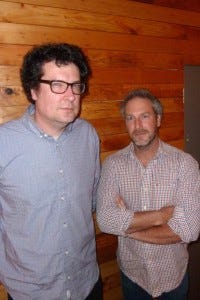
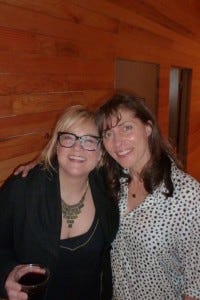
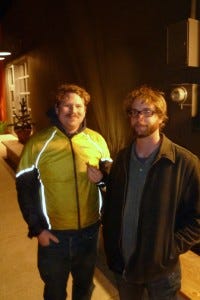
After about a half hour of this, a man in the back stood up and asked, in a thick Scottish accent, “Will we get to ask questions, or do we just get to sit here and get lied to all night? And that’s not a rhetorical question.”
The room stopped.
1. Arthur Bradford reads from Sarah.
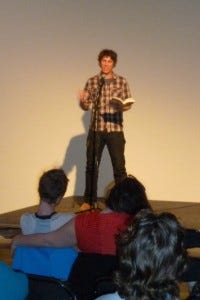
The man, who I later learned is local writer Barry Graham (his account of the evening is here), challenged Albert on several fronts, attacking her authenticity, asking why we should believe anything she says, and demanding she provide names, venues, and specific verifiable details about the things she’d talked about that night. Albert didn’t directly answer his questions, instead reiterating what was said at the beginning: “I’m a liar.” The exchange continued, with Graham asking for specifics, and Albert shrugging him off. Both Bradford and Sampsell seemed uncomfortable and both tried to deflect the questions and come to Albert’s defense. Other people tried to ask other questions, but Graham was unrelenting, and continued to stand and demand answers. In his frustration, he attacked the relevancy of her writing by stating that most of the tickets to the event had been given away, and that about half of the crowd had already walked out. Eventually he became so frustrated and disgusted with her that he yelled, “You’re a disgrace to the art of fiction! You’re a sociopathic liar!”
Albert simply responded, “I’m a pathological liar.”
The reading never really recovered from there. A few more questions were asked, but the audience members who weren’t leaving because of the uncomfortable exchange were instead whispering to each other about it. Some people felt Graham had done the right thing from a journalistic perspective, asking a public figure to back up the things that they had said. Others felt his approach was too aggressive and disrespectful for such an event. But then there were the deeper questions, and these are the ones that have stayed with me since. If the writing stands on its own, does the behavior — in this case, the dishonesty and manipulation — of the author really matter? Can you separate art from artist, or writing you like from a person you despise? Does any of it really matter anyway?
***
— Jeanne Laravuso (text) is a freelance writer and editor living in Portland.
— Judith Ossello (photos) lives and writes in Portland. Find her at writerloop.com







